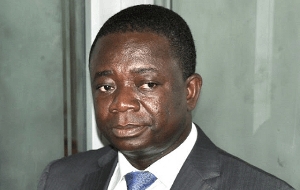- Home - News
- TWI News | TV
- Polls
- Year In Review
- News Archive
- Crime & Punishment
- Politics
- Regional
- Editorial
- Health
- Ghanaians Abroad
- Tabloid
- Africa
- Religion
- Election 2020
- Coronavirus
- News Videos | TV
- Photo Archives
- News Headlines
- Press Release
General News of Friday, 22 January 2010
Source: GNA
Ministry of Foreign Affairs approached NIB - Witness
Accra, Jan. 22, GNA - An official of the National Investment Bank (NIB) on Friday told an Accra Fast Track High that the Ministry of Foreign Affairs and Regional Integration approached the bank to facilitate the importation of rice from India.
Mr. Michael Amafode, Head of Legal Department of the bank said minutes at a meeting held on April 1, 2009 between Mr. Daniel Charles Gyimah, former Managing Director of NIB and the new management led by Dr P.K Kuranchie indicated that the bank established Letters of Credit to assist the transactions, which led to the importation of 15, 000 tons (300,000 bags) of rice.
Mr. Amafode was testifying in the case in which Akwasi Osei-Adjei, former Minister of Foreign Affairs, Regional Integration and NEPAD and Gyimah are before the court in connection with the importation of the rice.
They are facing eight counts of conspiracy, contravention of the provisions of the Public Procurement Act (Act 663), use of public office for profit, stealing and wilfully causing financial loss to the state to the tune of 1,408,590 dollars.
They have pleaded not guilty to the various charges and the court presided over Mr. Justice Bright Mensah has admitted them to bail in the sum GH¢200,000 with two sureties each.
The sureties to consist of immovable property and their title deeds are to be deposited at the Court's Registry. As part of the bail conditions, the two would report to the Bureau of National Investigations (BNI) once a week. Mr. Amafode, was being cross-examined by Godfred Yeboah Odame, Counsel for Osei-Adjei.
He told the court that anytime the Board Secretary was absent, he was invited to take down the minutes at NIB board meetings.
"I remember the new management arguing that the bank was not in favour with the rice importation, but Gyimah insisted it was a government programme," he said.
Mr. Mafode told the court that it was not out of place for the bankto assist its clients to import food commodities into the country and keep them at its warehouses.
Asked whether he was aware that it was the bank that dealt directly=
with the Indian Government and not Ghana Government? He answered that "he was not in a position to tell". Colonel Alex Johnson (Rtd), Counsel for Gyimah during cross-examination asked the witness whether by the nature of his work he
had come across any document citing importation of the Indian rice into t= he country, he answered in the negative. "I don't remember seeing this document anywhere, I don't know the background to this document," he said. Mr. Alex Kofi Akude, Project Officer at the Credit Monitoring Department of NIB, told the court that management arranged with
government to set up a committee to sell the rice through tender. He said initially 38 companies submitted bids to purchase the rice but the committee tasked to supervise the sale selected 10
companies. Witness said the committee conducted a market survey to find out prices pertaining at the various markets and how much they
were going to sell the Indian rice. He said the Indian rice arrived in the country in February 2009 and=
evacuation of the rice from the Customs, Exercise and
Preventive Service bonded warehouses on the Spintex road for the sale started around September 2009. Mr. Akude said the Letters of Credit was raised for 300,000 bags of rice and so far the committee had been able to sell 284,700
bags with additional 13,755 bags to be evacuated by customers. He said the amount raised for the LC was GH¢15,126,291 and the tot= al amount realised from the sale was GH¢8,536,194. Witness said the cost of warehousing the rice amounted to GH¢1,171= ,257, taxes being GH¢1,443,600 cedis bringing the deficit in
the transactions to GH¢10,973,166. Facts of the case are that somewhere in February 2008, Mr. Joe Baidoo-Ansah, Former Minister of Trade and Industry, initiated
importation of the rice from India. In a letter dated February 13, 2008, he requested Government throug= h the Ghana High Commission in India, to purchase 100,000
metric tons of (25 per cent to 35 per cent broken rice). The rice was expected to arrive in Ghana by May 2008 to help to cur= b the severe increase of price of staples in Ghana and the
designated consignee was Ghana National Procurement Agency. Mr. Baidoo-Ansah in another letter dated on April 10, 2008 addresse= d to the Minister of External Affairs of India, referred to an
earlier meeting held between Former President John Agyekum Kufuor and the=
Minister of Commerce of India. In the said letter Mr. Baidoo-Ansah drew attention to "severe food situation looming in Ghana" and sought to procure from the
Government of India 300,000 metric tons of low grade white 25 per cent broken rice for shipment to Ghana by June 2008. However, in April 2008, Osei-Adjei took over the efforts of Mr Baidoo-Ansah and nominated NIB as the sole consignee. Gyimah represented the Bank and negotiated the terms of the contract=
with State Trading Corporation of India through the Ghana
High Commission in India. Osei-Adjei instructed Ghana's High Commissioner in India to sign the=
contract on behalf of Ghana Government. The contract was executed and 15,000 metric tons of rice was to be shipped by Amira Foods Limited of India, a private shipping
company and on February 18, 2009, the consignment arrived at the Tema Harbour. Initially, exportation of the rice to Ghana was supposed to be a gra= nt but later turned into commercial transaction noting that
Gyimah approached Citibank to issue Letters of Credit to cover the value of the consignment. On arrival of the rice, efforts by the NIB to obtain import tax exemption from Ministry of Finance and Economic Planning to clear the
rice were denied due to the commercial nature of the contract and non-involvement of the Ministry in the transaction. The rice on arrival was kept in Customs Excise and Preventive Servic= e bonded warehouse. However, after taking stock of the consignment, it was noticed that 2,997 bags were missing and the rest was in varying states of
unwholesomeness. The Prosecution said the Management of NIB was making efforts to sel= l the remaining rice through tender. It said investigations conducted by the BNI revealed that provisions= of the Public Procurement Act were not followed and the
missing 2,997 bags had been diverted for sale elsewhere for huge private profit. The case was adjourned to January 28. 22 Jan. 10










